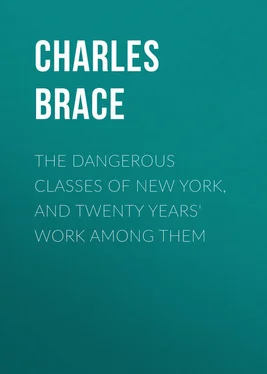Charles Brace - The Dangerous Classes of New York, and Twenty Years' Work Among Them
Здесь есть возможность читать онлайн «Charles Brace - The Dangerous Classes of New York, and Twenty Years' Work Among Them» — ознакомительный отрывок электронной книги совершенно бесплатно, а после прочтения отрывка купить полную версию. В некоторых случаях можно слушать аудио, скачать через торрент в формате fb2 и присутствует краткое содержание. Издательство: Иностранный паблик, Жанр: foreign_antique, foreign_prose, на английском языке. Описание произведения, (предисловие) а так же отзывы посетителей доступны на портале библиотеки ЛибКат.
- Название:The Dangerous Classes of New York, and Twenty Years' Work Among Them
- Автор:
- Издательство:Иностранный паблик
- Жанр:
- Год:неизвестен
- ISBN:нет данных
- Рейтинг книги:5 / 5. Голосов: 1
-
Избранное:Добавить в избранное
- Отзывы:
-
Ваша оценка:
- 100
- 1
- 2
- 3
- 4
- 5
The Dangerous Classes of New York, and Twenty Years' Work Among Them: краткое содержание, описание и аннотация
Предлагаем к чтению аннотацию, описание, краткое содержание или предисловие (зависит от того, что написал сам автор книги «The Dangerous Classes of New York, and Twenty Years' Work Among Them»). Если вы не нашли необходимую информацию о книге — напишите в комментариях, мы постараемся отыскать её.
The Dangerous Classes of New York, and Twenty Years' Work Among Them — читать онлайн ознакомительный отрывок
Ниже представлен текст книги, разбитый по страницам. Система сохранения места последней прочитанной страницы, позволяет с удобством читать онлайн бесплатно книгу «The Dangerous Classes of New York, and Twenty Years' Work Among Them», без необходимости каждый раз заново искать на чём Вы остановились. Поставьте закладку, и сможете в любой момент перейти на страницу, на которой закончили чтение.
Интервал:
Закладка:
This sad history is lived out every day in New York. If any theorists desire to see what fruits "Free Love" or a weak marriage-bond can bear among the lowest working-classes, they have only to trace the histories of great numbers of the young thieves and outcasts and prostitutes in this city. With the dangerous classes, "elective affinities" are most honestly followed. The results are suffering, crime, want, and degradation to those who are innocent.
A most powerful and continual source of crime with the young is inheritance – the transmitted tendencies and qualities of their parents, or of several generations of ancestors.
It is well-known to those familiar with the classes, that certain appetites or habits, if indulged abnormally and excessively through two or more generations, come to have an almost irresistible force, and, no doubt, modify the brain so as to constitute almost an insane condition. This is especially true of the appetite for liquor and of the sexual passion and sometimes of the peculiar weakness, dependence, and laziness which make confirmed paupers.
The writer knows of an instance in an alms-house in Western New York, where four generations of females were paupers and prostitutes. Almost every reader who is familiar with village life will recall poor families which have had dissolute or criminal members beyond the memory of the oldest inhabitant, and who still continue to breed such characters. I have known a child of nine or ten years, given up, apparently beyond control, to licentious habits and desires, and who in all different circumstances seemed to show the same tendencies; her mother had been of similar character, and quite likely her grandmother. The "gemmules," or latent tendencies, or forces, or cells of her immediate ancestors were in her system, and working in her blood, producing irresistible effects on her brain, nerves, and mental emotions, and finally, not being met early enough by other moral, mental, and physical influences, they have modified her organization, until her will is scarcely able to control them and she gives herself up to them. All those who instruct or govern "Houses of Refuge," or "Reform Schools," or Asylums for criminal children and youths, will recall many such instances.
They are much better known in the Old World than this; they are far more common here in the country than in the city.
My own experience during twenty years has been in this regard singularly hopeful. I have watched great numbers of degraded families in New York, and exceedingly few of them have transmitted new generations of paupers, criminals, or vagrants.
The causes of this encouraging state of things are not obscure. The action of the great law of "Natural Selection," in regard to the human race, is always towards temperance and virtue. That is, vice and extreme indulgence weaken the physical powers and undermine the constitution; they impair the faculties by which man struggles with adverse conditions and gets beyond the reach of poverty and want. The vicious and sensual and drunken die earlier, or they have fewer children, or their children are carried off by diseases more frequently, or they themselves are unable to resist or prevent poverty and suffering. As a consequence, in the lowest class, the more self-controlled and virtuous tend constantly to survive, and to prevail in "the struggle for existence," over the vicious and ungoverned, and to transmit their progeny. The natural drift among the poor is towards virtue. Probably no vicious organization with very extreme and abnormal tendencies is transmitted beyond the fourth generation; it ends in insanity or cretinism or the wildest crime.
The result is then, with the worst-endowed families, that the "gemmules" or latent forces of hundreds of virtuous, or at least, not vicious, generations, lie hid in their constitutions. The immediate influences of parents or grandparents are, of course, the strongest latent tendencies to good, coming down from remote ancestors, be aroused and developed.
Thus is explained the extraordinary improvement of the children of crime and poverty in our Industrial Schools; and the reforms and happy change is seen in the boys and girls of our dangerous classes when placed in kind Western homes. The change of circumstances, the improved food, the daily moral and mental influences, the effect of regular labor and discipline, and, above all, the power of Religion, awaken these hidden tendencies to good, both those coming from many generations of comparative virtue and those inherent in the soul, while they control and weaken and cause to be forgotten those diseased appetites or extreme passions which these unfortunate creatures inherit directly, and substitute a higher moral sense for the low moral instincts which they obtained from their parents. So it happens, also, that American life, as compared with European, and city life, as compared with country, produces similar results. In the United States, a boundless hope pervades all classes; it reaches down to the outcast and vagrant. There is no fixity, as is so often the fact in Europe, from the sense of despair. Every individual, at least till he is old, hopes and expects to rise out of his condition.
The daughter of the rag-picker or vagrant sees the children she knows, continually dressing better or associating with more decent people; she beholds them attending the public schools and improving in education and manners; she comes in contact with the greatest force the poor know – public opinion, which requires a certain decency and respectability among themselves. She becomes ashamed of her squalid, ragged, or drunken mother. She enters an Industrial School, or creeps into a Ward School, or "goes out" as a servant. In every place, she feels the profound forces of American life; the desire of equality, ambition to rise, the sense of self-respect and the passion for education.
These new desires overcome the low appetites in her blood, and she continually rises and improves. If Religion in any form reach her, she attains a still greater height over the sensual and filthy ways of her parents. She is in no danger of sexual degradation, or of any extreme vice. The poison in her blood has found an antidote. When she marries, it will inevitably be with a class above her own. This process goes on continually throughout the country, and breaks up criminal inheritance.
Moreover, the incessant change of our people, especially in cities, the separation of children from parents, of brothers from sisters, and of all from their former localities, destroy that continuity of influence which bad parents and grandparents exert, and do away with those neighborhoods of crime and pauperism where vice concentrates and transmits itself with ever-increasing power. The fact that tenants must forever be "moving" in New York, is a preventive of some of the worst evils among the lower poor. The mill of American life, which grinds up so many delicate and fragile things, has its uses, when it is turned on the vicious fragments of the lower strata of society.
Villages, which are more stable and conservative, and tend to keep families together more and in the same neighborhoods, show more instances of inherited and concentrated wickedness and idleness. In New York the families are constantly broken up; some members improve, some die out, but they do not transmit a progeny of crime. There is little inherited criminality and pauperism.
Among these public influences on the young, it has been often a question with some, whether the Public Schools did not educate the daughters of the poor too much, and thus make them discontented with their condition, and exposed to temptation.
It is said that these working-girls, seeing such fine dresses about them, and learning many useless accomplishments, have become indifferent to steady hand-labor, and have sought in vice for the luxuries which they have first learned to know in the public schools. My own observation, however, leads me to doubt whether this occurs, unless as an exceptional fact. The influence of discipline and regular instruction is against the style of character which makes the prostitute. Where there is a habit of work, there are seldom the laziness and shiftlessness which especially cause or stimulate sexual vice. Some working-girls do, no doubt, become discontented with their former condition, and some rise to a much higher, while some fall; but this happens everywhere in the United States, and is not to be traced especially to the influence of our Free Schools.
Читать дальшеИнтервал:
Закладка:
Похожие книги на «The Dangerous Classes of New York, and Twenty Years' Work Among Them»
Представляем Вашему вниманию похожие книги на «The Dangerous Classes of New York, and Twenty Years' Work Among Them» списком для выбора. Мы отобрали схожую по названию и смыслу литературу в надежде предоставить читателям больше вариантов отыскать новые, интересные, ещё непрочитанные произведения.
Обсуждение, отзывы о книге «The Dangerous Classes of New York, and Twenty Years' Work Among Them» и просто собственные мнения читателей. Оставьте ваши комментарии, напишите, что Вы думаете о произведении, его смысле или главных героях. Укажите что конкретно понравилось, а что нет, и почему Вы так считаете.












